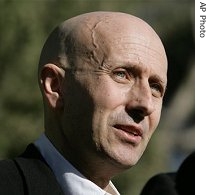Kidnapped BBC Journalist Alan Johnston, freed from captivity in Gaza
early Wednesday, has described his experiences in a meeting with the media in
Jerusalem. As Robert Berger reports from VOA's Jerusalem bureau, his enormous
relief is overshadowed by haunting memories.
Alan Johnston
emerged from the British Consulate in Jerusalem a happy man.
"It just is unimaginably good to be free," he said.
He looked and felt like a new man after a haircut, shower and shave.
"Maybe you have to have been a prisoner of some kind for some time to know
how good it is just to be able to do the most basic things that freedom allows,
not least to get a haircut," said Johnston.
"And you want to do everything at the same time, you know you want to read
books, newspapers, go to the movies, go to the beach and sit in the sun and eat
and talk and all the rest of it," he added.
So different, he said, than his nearly four months in captivity.
"It was as you can imagine the most appalling experience on and on, like
being buried alive and removed from life and sometimes, occasionally quite
terrifying, and always frightening in that I just didn't know when it would end
or how it would end," he said.
This story had a happy ending, when the shadowy group holding him, the Army
of Islam, handed him over to officials of the Islamic militant group Hamas in
Gaza. He said his situation changed when Hamas seized control of Gaza in last
month's civil war.
"Hamas is a controversial organization with a lot of problems and so on in
terms of relations with the outside world," said Johnston. "But I'm pretty sure
if Hamas hadn't come in and stuck the heat on in a big way, I'd still be in that
room."
Johnston was the only western journalist based in Gaza. The Gaza Strip has
been a no-go zone for western
journalists since Johnston was kidnapped, and it is not clear if they will start
going back.
no-go :閑人免進(jìn)的
點(diǎn)擊進(jìn)入更多VOA常速
(來源:VOA 英語點(diǎn)津姍姍編輯)